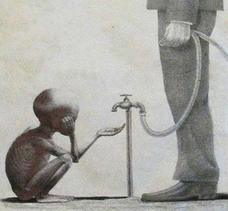 This blog post is not about what you think it is about; and yet it is precisely what you think it is about. Let me explain. A few days ago, I was reading an article, which was originally published on October 3rd, 2014, entitled "The White Problem". The author is Quinn Norton, who is a white journalist that covers hackers, bodies, technologies and the Internet. Firstly, her post and her part 2, "How White People Got Made", should be required reading for all Americans. Secondly, it raised several important points that most students of the humanities, and the history of peoples' interactions over the centuries, would appreciate and easily identify as artificial constructs erected in an effort to oppress and maintain privilege, which was and is the dominant driving force. For more context, read one of my all-time favorite books - "Pedagogy of the Oppressed". Tucked away in Quinn's paragraph was a sentence, which seemed to be nonchalantly included and inconspicuously placed, that caught my eye and that perfectly represents the state of the computing industry today: "Whites spent hundreds of years excluding others from resources, often by violence, and claiming ownership over wealth created by those same non-whites."  At the highest conceptual level, replace Whites with Tech Company Owners and you get a glimpse of what I saw. The last wave of uber-successful technology companies have two things in common:
A consequence of the second point is that content generators make pennies on their content; while content distributors and everyone else higher in the supply chain make orders of magnitudes more money. It is standard practice for the current (and emerging) set of tech companies to write into either Terms Of Use Agreement, Privacy Policy, End User License Agreement or other user agreement document that information supplied or generated by the user is property of the company and can be viewed as their asset that they can use to serve their purposes. The ultimate purpose is making a profit for the business owners. Their user base do not see any compensation from the use of their data. To selectively quote Quinn, "Whites spent ..... years excluding others from resources, often by violence, and claiming ownership over wealth created by those same non-whites." The violence component enters the picture when you think of the strategies that these companies employ to either attain or maintain their positions of dominance. This includes wage suppression of their employee pool, corporate espionage of their competitors, subverting the market protections and creating barriers to entry and growth through legislative and other means, etc. If the current American premise, only supported by the Citizens United ruling, is to be believed that corporations are people too, then all of the acts mentioned above would constitute violent, aggressive acts against real and corporate beings. If you don't believe that corporations are people, then the above behavior is simply immoral, callous and selfish on the part of the titans of corporate America and a direct jab at everyone else in society. Proponents may mention that this is all just good business and it is simply how the free market works. The Free Market is a product of everyone in it. It is dynamic. It is not something that is external and uncontrollable (or rather un-influence-able). We all help define, create and evolve the free market and the rules that acceptable or not. Thus, behavior in the sole interest of maximizing profit for your shareholders (and ignoring the potential severely negative consequences of one's actions) is not an unchangeable law of nature. It is yet another tool used by "whites" to wrestle control of resources from everyone else. All of this is further complicated when you examine the makeup of the company owner base and the user base. The company owner base has a high percentage of white men. The user base has a high percentage of minorities. The employee mix of these companies is predominantly white and Asian males - an issue that has been written about enough elsewhere [See Silicon Valley's Diversity Problem and How Diverse is Silicon Valley]. I leave the rest for you to ponder. "It was the best of times, it was the worst of times, it was the age of wisdom, it was the age of foolishness, it was the epoch of belief, it was the epoch of incredulity, it was the season of Light, it was the season of Darkness, it was the spring of hope, it was the winter of despair, we had everything before us, we had nothing before us, we were all going direct to Heaven, we were all going direct the other way - in short, the period was so far like the present period, that some of its noisiest authorities insisted on its being received, for good or for evil, in the superlative degree of comparison only."
- A Tale of Two Cities (1859), Charles Dickens.
0 Comments
|
Dr Tyrone Grandison
Executive. Technologist. Change Agent. Computer Scientist. Data Nerd. Privacy and Security Geek. Archives
May 2018
Categories |


 RSS Feed
RSS Feed
